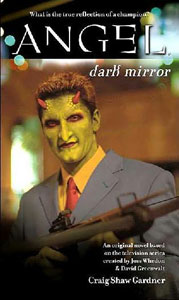There was never an “Angel” young-adult book line, but Craig Shaw Gardner’s “Dark Mirror” (April 2004) gives a sense of what those books would be like. This is a simplified view of the Angelverse without much interest in continuity or accurate characterizations, and with a cartoonishly big evil that’s hard to take seriously.
It starts off OK, with a Philip K. Dickian sequence of a man named Phil Manchester being chased by his own double. He aims to get to his friends at Angel Investigations for help. The story doesn’t so much grow from here as it just spreads out. Eventually, evil doppelgangers of the whole gang are out and about. “Dark Mirror” lacks the suspense of “Which one is the real person,” since the evil version says mean things to try to get under the skin of the real one by playing on their inner guilt, and they also show flashes of their true demonic visage. On the few occasions when the fake version tricks the good guys, it’s quickly resolved.
Considering how many good Buffyverse episodes came from the actors performing as alternate versions of their character, it’s odd that this conceit falls flat in the spinoff fiction. Reliable writer Jeff Mariotte would give it a shot in the “Angel” comics a year later with “Old Friends,” another story where everyone recognizes the false versions fairly easily and there’s little suspense.
“Dark Mirror” never builds up any real suspense, in part because I never get a solid sense that Gardner understands these characters on more than a broad level. Almost none of the dialog rings true, and the author has one lame joke that he keeps returning to: Angel’s inability to understand cellphones.
The book is set in Season 4, but it’s difficult to fit into the continuity since Cordy and Connor have built a close relationship (suggesting it’s in the heart of Season 4) and Gunn and Fred are still in a good place (suggesting very early in Season 4). I guess we could say it does take place when Gunn and Fred are indeed struggling with their relationship after the events of “Supersymmetry” (4.5), but they are going through a good patch at this point.
Similar to the “Buffy” YA novel “Little Things” (2002), which I consider to be the weakest “Buffy” book, this weakest “Angel” entry is in the YA style but not suitable for young readers. Notably, Wesley and Lilah have sex, something that would be easy to write around. Their relationship, like all relationships in this book, is off-point, as Gardner leans toward the idea that they like each other and happen to be on opposite sides of a conflict. The author doesn’t dig into the self-loathing that drives the relationship, at least at Wesley’s end.
Another YA trait is that the A.I. gang know they are in a narrative arc, with multiple references to a “final showdown” coming up. “Time for the Gunfight at the O.K. Corral,” Lorne says to close one chapter. That final showdown is basically a video-game stage. If you kill your double, it is permanently destroyed. If you kill someone else’s double, it regenerates. Destroying a big stone ends the game for good.

Gardner, who also wrote the mediocre “Buffy” entry “Return to Chaos” (1998), tries to throw in some character psychoanalysis in the showdowns of the heroes and their doubles, but it’s ineffective stuff that doesn’t faze our heroes for a moment. The conceit that the doubles will try to draw out our heroes’ feelings of guilt over past behavior is a good one, but the doubles are pathetic at it. As noted, Gunn’s guilt over killing a man for Fred’s sake, and Fred’s guilt over distancing herself from Gunn for that act, are not brought up at all. For all the talk of how these villains have taken over countless dimensions via their body-swapping, there’s never any true sense of a threat in “Dark Mirror.”
Click here for an index of all of John’s “Buffy” and “Angel” reviews.

